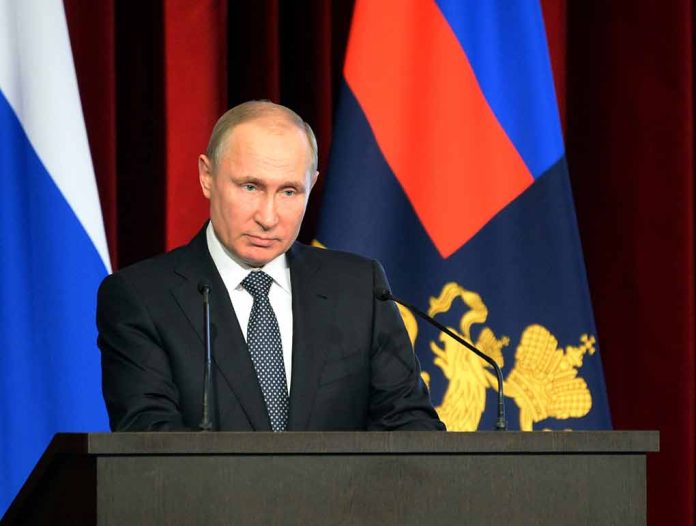
Russia’s new legislation targeting childlessness and non-traditional family structures aims to bolster traditional familial values yet fuels global debate.
At a Glance
- Russian lawmakers passed a bill banning “propaganda” against having children.
- Violations could result in substantial fines and deportation for foreigners.
- The legislation aligns with Russia’s focus on traditional family values.
- It will soon be reviewed by the upper house and likely signed by President Putin.
New Laws Reinforce Traditional Values
Russian lawmakers have passed legislation that prohibits the promotion of childlessness. The laws address “propaganda” against having children, a direct challenge to Western liberal ideologies. These measures, part of Russia’s broader strategy to mitigate demographic challenges like an aging population and low birth rates, apply to various media channels. Substantial fines of up to 400,000 rubles for individuals and 5 million rubles for businesses are among the stipulated penalties, with deportation threats looming over foreign violators.
This legal endeavor aligns tightly with Russia’s traditional family values. Such moves reflect the nation’s commitment to curtail influences undermining these deeply ingrained societal tenets. Legislation in this ambit intends to “protect citizens, especially the younger generation, from information that negatively affects personality development,” a sentiment echoed by Vyacheslav Volodin.
#Russia news digest, Nov 12:
– a law banning the "propaganda of the childfree ideology" was adopted
– foreign adoption of RU children was banned in case when a given country's laws allow gender transition
– N. Buyanova, a pediatrician, was sentenced to 5,5 ys in prison for…— Maria Domanska (@MDomanskaOSW) November 12, 2024
Pending Presidential Approval
The legislative package is now awaiting review by the Federation Council and is anticipated to secure the approval of President Vladimir Putin. This legislation, part of Russia’s conservative shift, is seen as a defensive measure against liberal values. It complements other strict regulations, including bans on LGBTQ “propaganda.” The emphasis on family and childbearing echoes Russia’s constitutional revisions in 2020, which prioritized children in state policy.
“This is a fateful law… Without children, there will be no country,” says Vyacheslav Volodin.
The public policy also restricts adoption by foreign nationals from countries that allow gender reassignment, a facet of Russia’s assertive legislative course. This additional layer echoes existing restrictions against gender transitions and signifies Russia’s broader legislative push against non-traditional gender and family configurations.
Russia is planning to ban "child-free ideology" — similar to what it did with "LGBT propaganda" — claiming that promoting childlessness threatens the country’s traditional values. pic.twitter.com/doUbRtCCNM
— DW News (@dwnews) October 3, 2024
Critics and International Reaction
Critics, including the International Federation for Human Rights (FIDH), argue that these laws infringe on freedom of expression and endanger reproductive rights. They opine that the demographic issues Russia faces stem from internal factors, such as war and emigration, rather than external ideological influences. As Russia declared 2024 the “Year of the Family,” with initiatives solidifying family structures, the global community watches closely how these developments reshape Russia’s social and political fabric.
Facing criticism domestically and internationally, Russian lawmakers continue advocating for increased birth rates and traditional family paradigms. Observers argue that while these laws may reflect the nation’s cultural ethos, asserting them positions Russia on a decline in international relations, orienting towards isolation amid expanding global interconnectedness.














